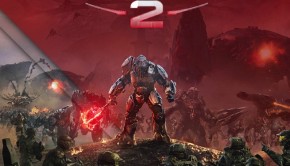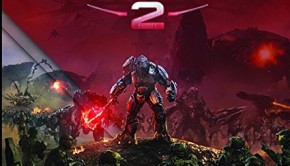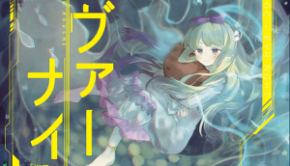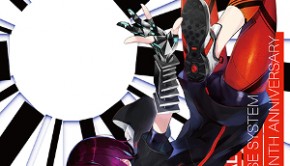Halo 4 Original Soundtrack Volume 2
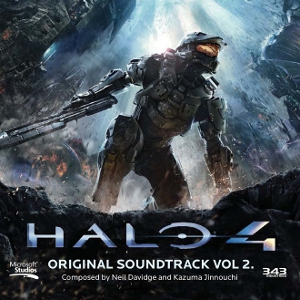 |
Album Title: Halo 4 Original Soundtrack Volume 2 |
| Record Label: 7Hz Productions |
|
| Catalog No.: N/A |
|
| Release Date: April 8, 2013 |
|
| Purchase: Download at Official Site |
Overview
Halo 4 is the first game in the new Reclaimer Trilogy and the first to be headed by 343 Industries, who took over the series after Bungie split off from Microsoft back in September 2007. We have a new story, a new planet and new characters like the Prometheans, the Didact and the Librarian. The game and the environment have changed enough to allow for a shift in direction, musically. After three main games and two spin-offs scored by Martin O’Donnell and Michael Salvatori, 343 decided to mix things up a little by creating a musical team of their own. From a list of about 65 different composers, company sound director Sotaro Tojima (Castlevania: Circle of the Moon, Metal Gear Solid 4: Guns of the Patriots) selected to contract Neil Davidge (DNA, Massive Attack) and hire Kazuma Jinnouchi (Metal Gear Solid 4: Guns of the Patriots, Metal Gear Solid: Peace Walker). 15 tracks from the score were released in the first volume of the physically-released Halo 4 Original Soundtrack, all but one of which were Davidge’s work. The digitally-released Volume 2 soundtracks features a more even split, with Davidge heading 11 compositions and Jinnouchi directing 9 of them.
Body
To start of the album, we have a triple dose of Jinnouchi’s works. The opener “Atonement” is a rather beautiful choral piece true to the series’ past heritage. Although I think it’s a bit on the slow side to begin with, the solo chanting work here is really moving. The piece builds up magnificently toward the end with an electronic stab here and there before the brass and strings perform a sombre passage that eventually settles down into a remake of O’Donnell’s iconic piano motif of “Keep What You Steal” from Halo 3. “Gravity” is Jinnouchi’s compliment to Davidge’s “Belly of the Beast” track from the first volume. Jinnouchi’s composition is a lot more frantic and chaotic in nature, as it’s designed as more of an escape piece rather than a battle piece. It even uses a snippet of Jinnouchi’s “Intruders” motif at one point on brass. A big, tense heart pounder almost bordering on John Williams’ Star Wars territory. “Wreckage” is a dark reprisal of Jinnouchi’s “117” theme, featured on the first volume, with my favourite part being the big rise and fall of the orchestra and synths from 0:48 to 2:08. It’s one of my favourite pieces of music on the album, combining an O’Donnell vibe with a darker Jinnouchi twist.
Looking to Davidge’s side of the fence, “Aliens” is one of my favourite pieces from Davidge in this volume given its multifaceted nature. It starts off with as an eerie percussive segment, then around the one minute mark introduces a howling electronic whistle coupled with a tribal-style choral chant. Davidge’s atmospheric mastery takes centre stage from here to 3:36 where the tribal chant comes back in full force along with some big booming timpani to really hit that feeling of awe and mystery home. “Kantele Bow” is the most Massive Attack-like track in the game and it shows: it is completely out of left-field for a battle track, yet strangely enough it works for me. Especially with the Bristol-inspired beats that make up the rhythm, as well as the pulsating synth blips. Most (if not all) of the ambient drones, swells and scrapes that you can hear in the background come from a bowed kantele, hence the name. One of the trippiest tracks for sure.
I also love Davidge’s “Pylons”, which is 5 minutes and 39 seconds of complete and utter chaos! The distorted cello at 0:39 makes me think that a swarm of angry bees are about to come chasing after you. This composition has an intense rock feel at times, not unlike “Faithless” from Volume 1. In this case, however, the electric guitar is being used primarily as an accent to create additional impact to the already heavy drums. Speaking of the drums, they give off almost a Mike Post NYPD Blue vibe, which I particularly like when most of the instruments give way from the 3:59 mark. For compositions like this, Davidge looks as though he’s giving his musical mindset security through obscurity.
“Escape” is a lot more traditional, so to speak. The majestic, Hollywood film-styled orchestration is a little more conventional: a very tense action piece with some particularly intriguing chord progressions. I especially love all the string movements going on throughout, plus the killer synth bass from the 1:05 mark. Next on the list is “Swamp”. Instrumentally resembling “What Once was Lost” from the first Halo game, it uses jungle-inspired electronic beats and industrial clangs that, for some reason, get stuck in my head just as easily as the beat of “117” from Volume 1. The twittering, reverberating undertones that make up the ambient melody would fit like a glove in a Metroid Prime title. However, I will admit that I prefer the E3 2012 version purely for the way it was edited together. Plus, it had this really trippy intro which is, rather disappointingly, cut from the final version. (You can hear this intro in the Halo 4 “Composing A Universe” documentary from 9:20-9:43).
Moving to Davidge’s last set of compositions, “Push Through” is another piece inspired by the original Halo, taking an inspired page out of “The Long Run” from Marty O’Donnell’s playbook. The militaristic drum patterns and suspenseful brass and string movements make for a real good time, blasting the hell out of your enemies in a Scorpion tank as you push your way up the hill. “Convoy”, as its name suggests, is featured when the player and an entire legion of troops force rival factions aside in order to get from point A to point B. To be honest with you, I feel like this track’s pacing represents more of a leisurely cruse down the local beach esplanade than a convoy rolling down the mountainside. However, I do like the ostinato strings in conjunction with the leisurely, walking-pace beat.
The final Davidge piece before Jinnouchi’s brief reintroduction is “To Galaxy (Extended)”. Now, for those of you who went out and bought the physical release of the Halo 4 Original Soundtrack Volume 1, “To Galaxy (Extended)” appeared as a downloadable extra track along with “Armour” and “Foreshadow” (and, if you purchased the Limited Edition version of the soundtrack, “Desecration”). Now, somewhat oddly, this particular iteration decides to pick up where the bonus incarnation left off. It starts off rather nicely with the familiar “To Galaxy” motif that we all know and love, but then it shifts down several keys and gets darker and edgier until the 4:08-4:36 mark, where it gets suitably heroic and upbeat thanks to some Back to the Future-inspired melodic lines on brass and countermelody on strings in a sort of “call and response” type structure.
Kazuma Jinnouchi temporarily steps out of the shadows to produce “Lasky’s Theme”. Beginning with some O’Donnell-like ambient build up, we get a rather mournful, but heroic melody on brass, akin to Stephen Rippy’s “Spirit of Fire” theme from Halo Wars, followed by some short, sweet electric guitar swells, ending a few notes that resemble a part of “In Amber Clad” from Halo 2. The leading instruments now move into a higher register and crescendo strongly to evoke a sense of hope to overcome a powerful foe. The song now moves back down into its original key with a full-on orchestral company backing up the leading lines, complete with a big belting choir.
Neil Davidge shows up one more time to pen down a final three compositions, two of which we’ve already heard before as bonuses in Volume 1. “Foreshadow”, for me, is the perfect dark piece of the entire soundtrack. It’s almost like a warped and twisted take on Kazuma Jinnouchi’s “Atonement” track from earlier on in the album. If you meticulously listen to the more eerie and dissonant Halo music of old, especially pieces to do with the Flood, like “Devils…. Monsters” from Halo, “Ancient Machine” from Halo 2, and “Dread Intrusion” from Halo 3, then you’ll notice that “Foreshadow” has a lot in common with those pieces in terms of atmosphere. But I prefer the bonus version myself; not purely just because of the longer run time, but because the final version as heard in Volume 2 shaved off an awesome outro section that really didn’t need to be shaved off at all. Oh well, at least the bonus version has a definite ending to it, instead of that rather cheaply placed musical cliffhanger that most like to call a fade out. “This Armour”, on the other hand, is the perfect light-hearted tune on the whole album. In a sense, it’s like the personification of the artist’s tagline for the musical score of Halo 4 in that “it’s not a revolution, it’s an evolution of the past Halo scores”. Formerly known as “Armour”, this is the other track we’ve heard previously in the Volume 1 bonuses. But much like “Foreshadow”, it’s had its length reduced from 5:43 to 4:48. Again, much like “Foreshadow”, the section that was removed really didn’t need to be removed in the first place.
“Cloud City” is up next and it’s an odd one, to say the least, or at least its middle section is, at any rate. In a sense, reinforcing the “security through obscurity” method I briefly touched on before. It, like the “Push Through” track that I mentioned earlier in the review, has a beat reminiscent of “The Long Run” from Halo, combined with an oriental-influenced chord progression similar to “Solace” from Volume 1. Because of this I find the beginning and ending sections of “Cloud City” to be almost heavenly. As for that middle section, I have no idea what’s going on. The most apt description I can make of it is pointless, trippy ambient filler that doesn’t really go anywhere. According to Davidge’s Facebook page, “Cloud City” is 14 minutes long unedited. If that statement is to be believed, then who knows where this composition could have headed.
Enter Kazuma Jinnouchi again to close out the album with 5 compositions in a row. “Intruders” is technically, the first piece of music you hear within gameplay, while you’re reacquainting with the severed rear half of the UNSC Forward Unto Dawn, it’s most commonly associated with the Covenant (yes, they’re back!) whenever they barge in and wreck the place up. A very nice, stealthy infiltration theme with lush staccato strings, sweeping brass swells and synths that seems to swirl in and out of the mix. It also happens to get its melody alluded to in “Gravity”.Behold, “Mantis”! This composition is a rich, flowing, action-packed rearrangement of “117”. And I have to say, deep down inside, I must be a real sucker for fast-paced strings, because this track is filled them! Further emphasising that this soundtrack progresses in a non-chronological way, “Sacrifice” is, more or less, the music that plays in the opening cutscene, among other things. Much like the rest of Jinnouchi’s music, it’s some good stuff.
The fruits of Jinnouchi’s labour, I give you the “Never Forget (Midnight Version)”. I honestly never would have thought it was possible to surpass the Halo 3 version of “Never Forget” (which, in turn, is a rearrangement of “Unforgotten” from Halo 2) and by someone other than O’Donnell, I might add. But, wow! That’s all I can say, wow!! This touches upon something Sotaro Tojima, 343’s audio director once said about “music’s ability to make us cry”. From a background of humming, droning synths, the main chords play softly on the piano while the strings start to swell. And what’s that I hear at 0:50? Is it? It is! That loveable, Marty O’Donnell-written melody…. and it’s still sounds oh so sweet, even after nearly seven years on from Halo 3. I also love the clean, compressed, chorus tone of the electric guitar notes in the background. It sounds a lot more militaristic, with the melancholic brass work and the subtle rolls of the snare drums than O’Donnell’s rendition, but that’s what set this version apart from the other one. As I explained earlier Kazuma Jinnouchi’s not afraid to mix in a bit of the familiar and put his own twist on it. And last, but certainly not least, to close out the album is“Majestic”, which doesn’t actually play in the main campaign, but rather during the grand finale of the ten episode long, side mission-campaign mode, Spartan Ops. Anyway, “Majestic” is blinded by its majesty. Paralysed. Dumbstruck even. “This is the way the music ends. Not with a whimper, but a bang”.
Summary
To quote fellow Game Music Online comrade, Joe Hammond, from his review of Volume 1,“It’s a soundtrack of two halves”. Literally. It’s definitely epic, for lack of a better word, on both composers’ counts, but in vastly different ways, especially compared to previous albums. A recurring phrase for the score by the sound team was “evolution, not revolution”. And to me, they were only half right. Neil Davidge, on one hand, was the revolution, in a sense that he intentionally shied away from making his music even vaguely like those who came before him. Most of Neil’s anthemic, melodic tracks were already used by the time Volume 1 finished, so his material here is a lot more ambient and atmospheric by nature. It may be filler but it’s far from pointless. So, this is an atmospheric kind of epic. Although some people strongly disagreed with the direction that he took to the music, I for one loved it. Kazuma Jinnouchi, on the other hand, is the evolution, based on recurring traits of not being afraid to mix in key familiarities and place them in a new and original context. His pieces are huge, cinematic, thematic, and emotional, much like his work on the Metal Gear franchise. I particularly enjoyed how he introduced some thematical consistency with the leitmotifs,with variations of the “117” and some past favourites. His compositions represent an emotional kind of epic.
On the whole, the Volume 2 soundtrack presents plenty of highlights that aren’t available on the first volume. As a supplementary soundtrack, the quality of the tracks varies a little here and there are potential issues with track order and presentation. But is it worth checking out? I end my very first ever soundtrack review by quoting Mr. Hammond again. “Taken as an overall soundtrack, I think it’s worth giving it a chance, but I’d sample it and try it out before buying. After all, some people love it, while others hate it. There’s a few Halo purists out there that feel the new direction for the music loses the Halo identity and to an extent that’s true, but it’s also setting up a new identity. With establishment of a new sound, there’s lots of potential to expand upon in future scores for the juggernaut franchise”. Neil Davidge confirmed on his Facebook page a while back that he will not be returning to score any more Halo games. As Kazuma Jinnouchi is currently 343 Industries’ music supervisor and in-house composer, he will be taking over from now on and until it’s announced otherwise, it looks like he’ll go it alone from here. In fact, the Halo 5 trailer music was purely a solo effort from Jinnouchi.
Do you agree with the review and score? Let us know in the comments below!
4
Posted on May 18, 2014 by Milan Saunders. Last modified on May 18, 2014.

